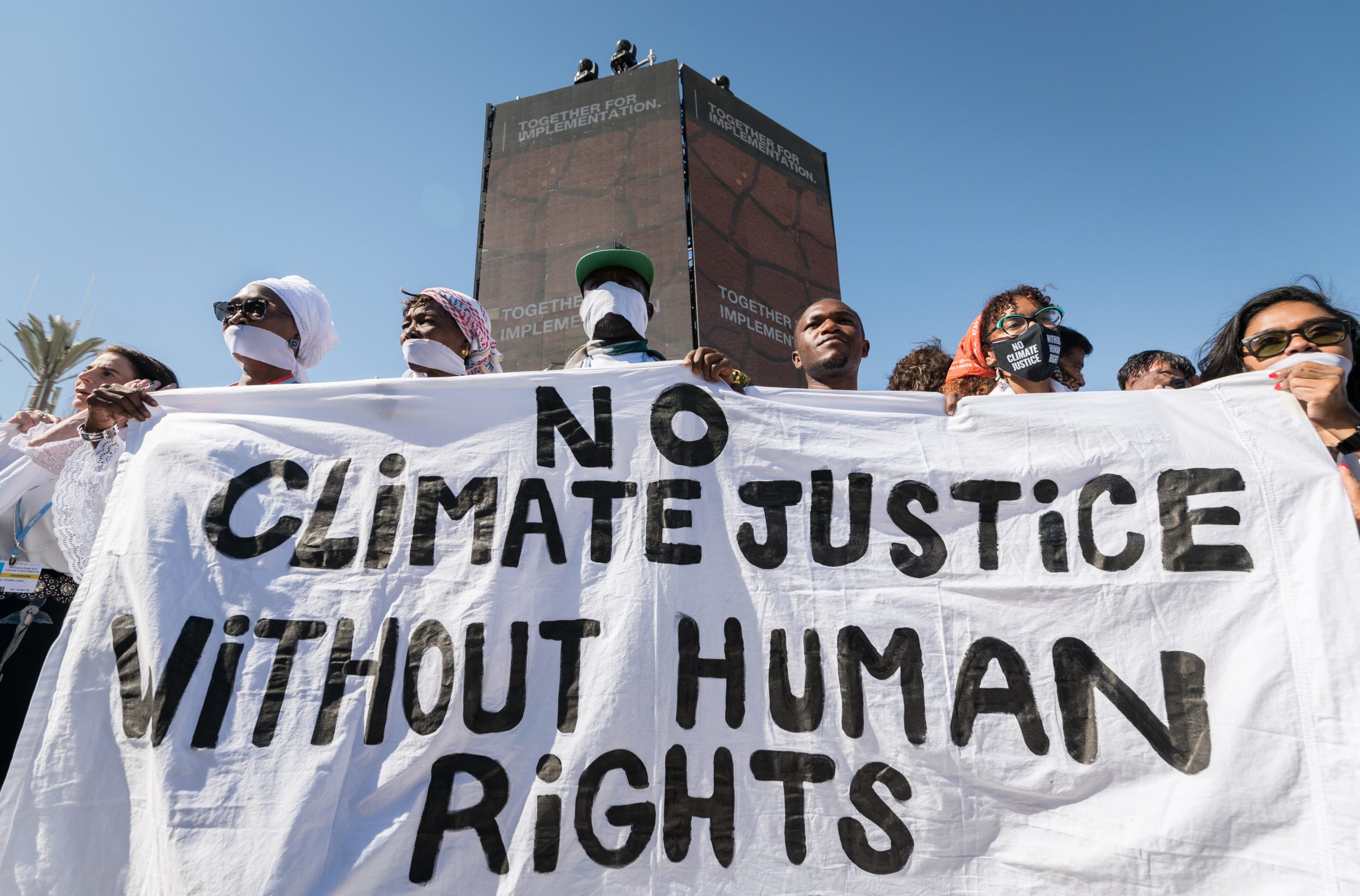On December 10, 1948, the United Nations adopted the Universal Declaration of Human Rights (UDHR), written to address the atrocities committed during World War II. Since then, the United Nations and other bodies have adopted additional documents on human rights. The International Bill of Human Rights includes the UDHR, the International Covenant on Economic, Social and Cultural Rights and the International Covenant on Civil and Political Rights.
Not included in the UDHR is any statement related to climate change – it wasn’t a known concern in the 1940s. However, in the years since, the United Nations has published additional documents about other human rights. One such report from the United Nations Environment Programme discusses the impact of climate change on rights.

People from around the globe rally at the venue of the United Nations climate change conference COP27 in Egypt, calling for respect of human rights. LWF/Albin Hillert
The introduction to the report says, “Anthropogenic climate change is the largest, most pervasive threat to the natural environment and human rights of our time.…These impacts, combined with direct harms to people, property, and physical infrastructure, pose a serious threat to the enjoyment and exercise of human rights around the world.”
To name a few impacts, climate change causes warmer global temperatures, rising sea levels and changes in precipitation patterns. These consequences put numerous human rights in jeopardy, as outlined in the UN report:
- Right to adequate standard of living: Disasters negatively impact living conditions for several reasons. Wildfires and storms can destroy or damage homes. Droughts and floods can ruin crops and endanger animals, which affects people’s livelihoods, especially in communities around the world that rely on agriculture and livestock.
- Right to health: The impacts of climate change are dangerous for people’s health. Pollution is harmful to people living in heavily populated areas or near factories. When people lose food sources, such as livestock and crops, or access to uncontaminated water, they face malnutrition and disease.
- Right to life: Climate change threatens the right to life every day for people around the world. More severe disasters can lead to more lives being lost. Losing the right to an adequate standard of living, health, food, water and other necessities threatens peoples’ lives daily. This is especially true for people of color and those living in vulnerable communities and countries, which suffer disproportionately when hit by a disaster.
Climate change endangers the human rights of people around the world, especially those in under-resourced communities and developing countries. Lutheran Disaster Response prioritizes the accompaniment of those who are most adversely impacted by consequences of the changing climate. During long-term recovery, we work with communities in mitigating the effects of future disasters, building resilience, and expanding preparedness capacity, knowing that disasters will continue to be more extreme.
Effective disaster response upholds all the rights described in the UDHR and subsequent documents. Even when people’s lives are upended by natural or human-caused disasters, their human rights should not be at stake. That’s why the work of Lutheran Disaster Response and our local partners in the United States and around the world is so important – after a disaster, when our neighbors are living in uncertainty, we walk with impacted communities, responding to their needs and supporting recovery efforts while simultaneously celebrating their strength and resilience.
Get involved
- Advocate. Visit the ELCA Advocacy Action Center to contact your congress members about vital issues impacting our communities, including government disaster response program reform and supporting refugees.
- Study. Read the ELCA’s social message “Earth’s Climate Crisis.” It provides theological rationale and social analysis to foster discernment and engagement relating to climate care.
- Volunteer. By volunteering in local disaster response through your synod or regional social ministry organization, you can ensure that survivors’ rights to adequate living is met.
- Donate. Lutheran Disaster Response is a trusted partner in disaster response. Your gifts to Lutheran Disaster Response help accompany our neighbors when their lives are upended by disaster. 100% of your gifts to a designated disaster go to disaster survivors.
